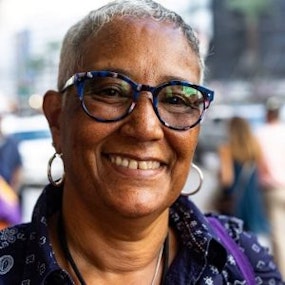ROBERT JOHNSON:
This is the award-winning Public Health Review Morning Edition for Tuesday, October 10, 2023. I'm Robert Johnson. Now, today's news from the Association of State and Territorial Health Officials.
GABBY RUIZ:
From 2019 to 2022, over 80,000 children were screened and referred to mental health services and provided mental health care through interventions supported by this grant program. So, it's been extremely positive.
JOHNSON:
ASTHO's Gabby Ruiz says the Infant and Early Childhood Mental Health grant program has allowed states to better support children and infants at risk of mental illness or other emotional challenges.
RUIZ:
These funds serve professionals who work with children and infants through prevention, early intervention, and treatment.
JOHNSON:
The grant program was authorized as part of the 21st Century Cures Act. It underscores the importance of taking the time to educate policymakers at every level.
RUIZ:
There are many strategies that can be put in place to promote infant mental well-being such as ensuring legislators are educated on the benefits of infant mental health programs that enhance access to mental health services, such as screening assessments and early intervention programs to promote the formation of legislation that supports infant mental health.
JOHNSON:
Beyond work happening in Congress, Ruiz says many ASTHO members including Hawaii, Alaska, Rhode Island, and Maryland have taken local action to improve state programs.
RUIZ:
So last year, Maryland enacted House Bill 513, which established the Infant and Early Childhood Mental Health Support Services Program, which is aimed at promoting positive mental and behavioral health practices in young children by offering referrals and services and includes a $3 million appropriation for the program each year.
JOHNSON:
ASTHO has more information about infant mental health and early brain development online. You can find it using the link in the show notes.
JOY RUCKER:
I think people just have to care about the issue and understand that people are really dying and get past the stigma of people using drugs.
JOHNSON:
Joy Rucker is a harm reduction expert who knows the overdose crisis needs a coordinated response from leaders in public health, harm reduction, and public safety. When it comes to working with law enforcement agencies, she says success depends on having a champion within public safety and the right message.
RUCKER :
And I think the biggest thing is, when we first started doing syringe exchange, our approach was, look, we want to make sure you guys are safe, and you don't get stuck by syringes. So, if we're doing syringe exchanges, you know, it's most likely people aren't going to have old syringes in their pockets if you stop them and search them. So, from our perspective, it was like, what we're concerned about your opportunity to get stuck with a dirty needle, and how can we reduce that harm.
JOHNSON:
Rucker also sees room for improvement within public health.
RUCKER:
What's difficult, in a lot of places that I see is that public health has decided that they are the experts in doing harm reduction and doing syringe exchanges. And they've set it up in a way that people will not go into a public health department to exchange syringes. So, I think they would be better suited in funding community-based programs that have relationships with people and that they're in communities where there's no stigma.
JOHNSON:
Hear more of Rucker's interview in a new episode of the Public Health Review podcast available now everywhere you stream audio.
Also today, ASTHO welcomes a new member to the organization. Dr. Steve Corsi is the new CEO of Nebraska's Department of Health and Human Services. Read more about his career and his appointment using the link in the show notes.
Finally, this morning, there's still time to apply for ASTHO's Diverse Executives Leading in Public Health Program. Don't miss this opportunity to gain new leadership skills and make new connections. The application deadline is this Friday, October 13 at 11:59 p.m. Eastern time. Get more information and apply by clicking the link in the show notes.
We'd also like to remind you to follow this newscast on your podcast player and ASTHO on social media. We are on LinkedIn, Twitter, and Facebook.
That'll do it for today. We're back tomorrow morning with more ASTHO news and information. I'm Robert Johnson. You're listening to the award-winning Public Health Review Morning Edition. Have a great day.






